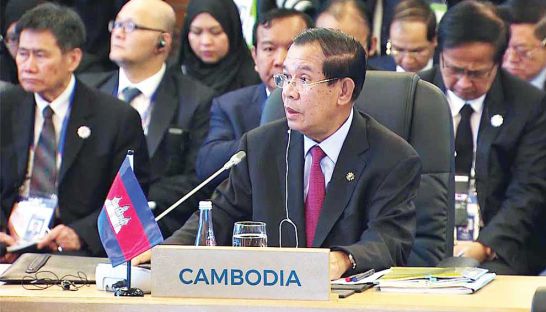
Prime Minister Hun Sen speaks yesterday at the ongoing Asean Summit in Manila. Photo supplied
In recent weeks, Hun Sen and other top government officials have repeatedly accused the US of colluding with the opposition Cambodia National Rescue Party to foment a so-called color revolution in the Kingdom, accusations the US Embassy has denied.
The claims have nonetheless precipitated the jailing of opposition leader Kem Sokha on charges of “treason” and the initiation of proceedings that could see the party dissolved as early as Thursday, developments that have drawn criticism from the US Embassy in Phnom Penh.
Addressing government leaders from all over the world at the summit in Manila yesterday, Hun Sen applauded Trump for his character and leadership, calling him a “wonderful” and “most respectful” person.
“You are a wonderful president for me . . . We want you to be strong and develop and be independent in your own country, trying your own efforts, for your people,” he said. “This is what we try together and develop together as a true partner and sustainable long-term partner.”
He claimed that he had been among the few in Cambodia who believed that Trump would win last year’s presidential election – a prediction he made publicly twice – before lamenting that opposition party leaders had criticised him for supporting Trump.
“I got attacked from the opposition party leaders [who said] that ‘those who have the same feather live in the same nest’. [They said] ‘Donald Trump is a dictator by using money, while Hun Sen is a dictator by using money and arms’,” he said.
Yet, if American officials respected Trump’s purported policy of nonintervention, America would “have a lot of friends”, the premier argued. He went on to chide the US Embassy in Cambodia, which he said ignored this principle.
“Your policy is being changed but the embassy in Phnom Penh has not changed it yet,” he said.
To bring the embassy in line, he asked Trump to “remind” his officers not to intervene in Cambodia’s internal affairs.
Hun Sen also appealed to Trump to forgive Cambodia’s 1970s-era war debt, which the Kingdom accrued under the Lon Nol regime mainly by buying American goods to cope with a refugee crisis caused, at least in part, by American bombing.
“It is like you get the hammer to hit on us, and we are going to pay for the cost of the hammer,” he said. The US Embassy declined to comment on the remarks yesterday.
But political analyst Ou Virak said it was unlikely that Trump would call the embassy to heel.
“Cambodia is not important enough for Trump to warn anyone,” he said. “I think Trump will have not a single clue what Mr Hun Sen is taking about as Cambodia is not worth a single word of his tweets.”
Over the course of the day, prior to Hun Sen’s speech, images trickling out of the summit had stoked a partisan back-and-forth over how Hun Sen was faring at the summit amid the widely criticised crackdown on the opposition back home.
Hun Sen supporters were quick to point to chummy photographs featuring Prime Minister Hun Sen posting with Trump – who flashed a thumbs-up sign – and with the liberal Canadian Prime Minister Justin Trudeau, among others.
Meanwhile, former opposition leader Sam Rainsy posted some screenshots showing the premier standing by himself far away from other leaders as alleged evidence of the premier being given the cold shoulder by other participants.
Council of Ministers spokesperson Phay Siphan said in a message that the “Cold War is no longer”, and as such, “sovereign states then cordially welcoming [him] on the international stage is normal”.
Cambodian People’s Party stalwart and former Foreign Minister Hor Namhong was more blunt, appearing to cast the friendly photo op with Trump as an indication of Hun Sen’s clout.
It’s better to “meet with the boss . . . than talking with the slaves”, he commented in Facebook post.
But Virak highlighted that photographs only reflected singular moments “in a [continuum] of events that could be completely different” and should not be given too much attention.
Meanwhile, Carl Thayer, emeritus professor at the University of New South Wales, said that Hun Sen likely wasn’t getting much attention at the Asean meeting in the first place.
“Quite frankly Cambodia ranks low on the list of important countries attending APEC and ASEAN-related meetings,” he said in an email. “This has more to do with Cambodia’s level of economic develop[ment] and the paucity of any worthwhile initiatives by Hun Sen to shore up regional peace and security.”
Thus country representatives were simply treating him “in accord with protocol”.
Thayer did acknowledge that the chummy photo ops could be used by the premier to “put his own spin” on the summit, but the focus of discussion “should be on who Hun Sen will be meeting for substantial bilateral sideline discussions”.